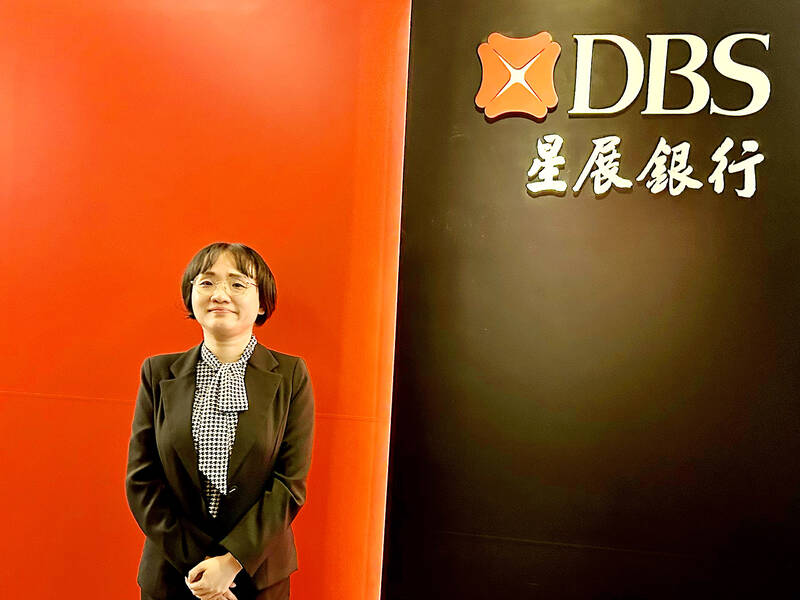The economy is forecast to grow 3 percent this year, slowing from a 4.4 percent increase last year, but consistent with a long-term growth trend on the back of rising demand for artificial intelligence (AI)-enabled smartphones, personal computers and other consumer electronics, Singapore-based DBS Bank Ltd (星展銀行) said yesterday.
Export growth is expected to remain in expansionary mode, although demand from AI data centers for servers would moderate after last year’s surge and a high base, DBS senior economist Ma Tieying (馬鐵英) said at a news conference in Taipei.
However, demand for AI-enabled mobile phones, notebook computers and other consumer electronic gadgets could gain traction, Ma said, noting that the upcycle in the global semiconductor sector typically lasts about 30 months and the current cycle, which began in September 2023, would therefore have the potential of extending throughout this year.

Photo: Wu Hsin-tien, Taipei Times
Private consumption is also to lose steam, but remain on trend given that the strong wealth effects of property and stock market rallies would taper off, she said.
Investment and speculative demand in the property market could diminish due to lingering credit controls, property taxes and anti-speculation measures, Ma said.
However, demand from first-time buyers and those seeking upgrades would remain resilient, she said.
Consumer price hikes would temper to 1.9 percent this year, lower than the 2.18 percent increase last year, with food and house prices normalizing from rapid advances induced by typhoons, electricity price hikes and higher housing rents, Ma said.
The US-China trade dispute and tech competition is set to escalate when US president-elect Donald Trump assumes power on Jan. 20, while Trump’s tariff threats on Chinese imports would impact Taiwanese manufacturers based there, she said.
Key products that Taiwanese companies produce in China include information and communications products, electrical machinery, optical instruments and electronic parts, Ma said.
Information and communications products and electrical machinery have a high resale ratio to the US, making them vulnerable to Trump’s 60 percent tariffs on Chinese goods, she said.
However, additional universal tariff hikes on all US imports would have limited impact on the competitiveness of Taiwanese products, she added.
As Taiwanese foundries command a dominant 80 percent of the global market for chips of 7-nanometer technology and below, Trump might pressure Taiwan to invest more in the US semiconductor sector and push for investment in 2-nanometer technology, posing challenges for Taiwan to retain its leadership in semiconductor technologies, Ma said.

Taiwan’s long-term economic competitiveness will hinge not only on national champions like Taiwan Semiconductor Manufacturing Co. (TSMC, 台積電) but also on the widespread adoption of artificial intelligence (AI) and other emerging technologies, a US-based scholar has said. At a lecture in Taipei on Tuesday, Jeffrey Ding, assistant professor of political science at the George Washington University and author of "Technology and the Rise of Great Powers," argued that historical experience shows that general-purpose technologies (GPTs) — such as electricity, computers and now AI — shape long-term economic advantages through their diffusion across the broader economy. "What really matters is not who pioneers

In a high-security Shenzhen laboratory, Chinese scientists have built what Washington has spent years trying to prevent: a prototype of a machine capable of producing the cutting-edge semiconductor chips that power artificial intelligence (AI), smartphones and weapons central to Western military dominance, Reuters has learned. Completed early this year and undergoing testing, the prototype fills nearly an entire factory floor. It was built by a team of former engineers from Dutch semiconductor giant ASML who reverse-engineered the company’s extreme ultraviolet lithography (EUV) machines, according to two people with knowledge of the project. EUV machines sit at the heart of a technological Cold

TAIWAN VALUE CHAIN: Foxtron is to fully own Luxgen following the transaction and it plans to launch a new electric model, the Foxtron Bria, in Taiwan next year Yulon Motor Co (裕隆汽車) yesterday said that its board of directors approved the disposal of its electric vehicle (EV) unit, Luxgen Motor Co (納智捷汽車), to Foxtron Vehicle Technologies Co (鴻華先進) for NT$787.6 million (US$24.98 million). Foxtron, a half-half joint venture between Yulon affiliate Hua-Chuang Automobile Information Technical Center Co (華創車電) and Hon Hai Precision Industry Co (鴻海精密), expects to wrap up the deal in the first quarter of next year. Foxtron would fully own Luxgen following the transaction, including five car distributing companies, outlets and all employees. The deal is subject to the approval of the Fair Trade Commission, Foxtron said. “Foxtron will be

INFLATION CONSIDERATION: The BOJ governor said that it would ‘keep making appropriate decisions’ and would adjust depending on the economy and prices The Bank of Japan (BOJ) yesterday raised its benchmark interest rate to the highest in 30 years and said more increases are in the pipeline if conditions allow, in a sign of growing conviction that it can attain the stable inflation target it has pursued for more than a decade. Bank of Japan Governor Kazuo Ueda’s policy board increased the rate by 0.2 percentage points to 0.75 percent, in a unanimous decision, the bank said in a statement. The central bank cited the rising likelihood of its economic outlook being realized. The rate change was expected by all 50 economists surveyed by Bloomberg. The